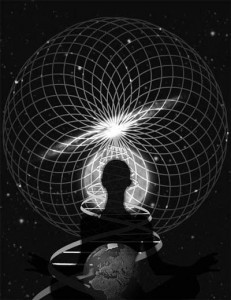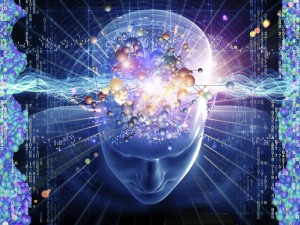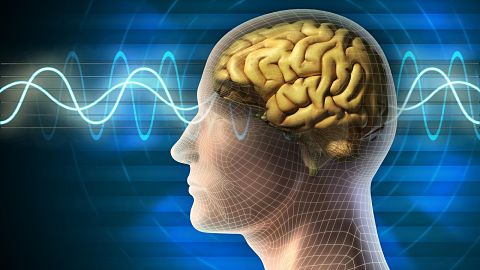The study of human consciousness is all the rage in scientific and philosophical circles. Only a decade ago people who delved into the questions of consciousness were relegated to the fringe.
 Most theories of consciousness begin with a pretentious veneration at how mysterious the phenomenon of so-called subjective experience is, and how difficult a problem the self is for science to solve.
Most theories of consciousness begin with a pretentious veneration at how mysterious the phenomenon of so-called subjective experience is, and how difficult a problem the self is for science to solve.
To my mind, the notion that content-consciousness and the sense of a separate self are an impenetrably enigmatic problem indicates a misunderstanding of both subjective experience and science, resulting from an overvaluation of both.
When philosophers and scientists talk about consciousness, they are almost always obsessing over the question: What brain processes make possible the ‘I’ that experiences the redness of a rose, the smell of earth after a rain, or the notes of a Mozart concerto? But let’s turn the question around: Is there an experiencing of these things without the ‘I?’
The privileging of both the self that experiences things, and the neuroscience that studies how the self does so, sustains mysteriousness–the counterfeit of genuine mystery. Ironically, it’s also the antithesis of science, which resolves mysteriousness.
There is a mystery about subjective experience that needs to be solved, to be sure, but there is no wonder in it, and ultimately, it isn’t even that interesting. The mystery of consciousness as awareness, on the other hand, can never be reduced and dissolved.
There’s something infinitely regressive and humorous about researching consciousness, since the same instrument that is the object of research is doing the research. The inherent circularity of the problem of studying consciousness does not seem to occur to most philosophers and neuroscientists however.
Science is the study of objective phenomena through observation, experiment, reason and evidence. Making an objective phenomenon out of subjective experience means either that subjective experience is an illusion open to objective study, or that the study is hopelessly circular, or both.
Subjectivity presents a scientific and philosophical conundrum. As philosophers say, information processing doesn’t just happen ‘in the dark;’ it happens with conscious experience. (Although, given the toxic levels of darkness that content-consciousness is producing, inwardly and outwardly, that’s an ironic way of putting it.)
The first question, it seems to me, is: Can consciousness as we usually know it (that is, symbolic mediation of experience, including the program and conditioning of the self) be scientifically studied and understood?
To a significant degree, the answer is yes, but there must first be a sound philosophical understanding of consciousness in both senses of the word. Otherwise the right questions cannot be asked, and experiments and observations will remain circular, simply confirming implicitly or explicitly held ideas scientists have about consciousness.
I read recently where an academic philosopher said, “to make progress on the problem of consciousness…I first isolate the truly hard part of the problem, separating it from the more tractable parts.” He goes on to describe, with no hint of self-awareness, how he “divides the associated problems of consciousness.”
The key words here are ‘separate, isolate and divide’—all core functions of conditioned or content- consciousness, which is fragmenting nature and humanity all to hell. Science is predicated on separation, which obviously has its place in utilitarian and scientific domains. But when the same separative principle is applied to the study of consciousness, it becomes destructively self-reinforcing of the fragmentary tendencies of human consciousness.
 In short, unawareness of implicitly held assumptions about consciousness may advance specialized knowledge in science, but they are harmful to the human prospect.
In short, unawareness of implicitly held assumptions about consciousness may advance specialized knowledge in science, but they are harmful to the human prospect.
‘Higher thought’ is the basis of consciousness as we usually know it. The function of thought is to separate, store, and manipulate ‘things’ in the environment. Therefore to speak of ‘dividing’ and ‘isolating’ one part of consciousness from another is to utterly fail to understand the essential nature of consciousness based on thought.
There is consciousness beyond thought, but it can only come into being when the mind/brain are completely still. That requires a great deal of self-knowing and attention, which few people are willing to give.
Be that as it may, the entirety of consciousness cannot ever be understood through ‘separating’ and ‘isolating’ its various elements. And since there is no science without doing so, we are confronted, in studying consciousness, with the intrinsic limitations of science.
As anyone who knows a self-unaware person realizes, it is quite possible to be functionally quite capable without having awareness of what one is doing or where one is coming from. Consciousness-as-awareness is more than the sum of the performance of mental functions, and awareness-as- consciousness is completely distinct from the contents of consciousness.
True consciousness is awareness that is empty and still, and true awareness is consciousness without the associations of memory. There is an experiencing without the mediation of self, symbols, and memories. Can such awareness be objectively studied, dissected and reduced? Obviously it cannot.
Negating the mechanism of the illusorily separate observer through passive watchfulness, unwilled attention to the movement of thought/emotion leads beyond the subjective experience of the self, to the capacity of the brain for timeless awareness of the sublime.
As Einstein said, “Try and penetrate with our limited means the secrets of nature, and you will find that, behind all the discernible laws and connections, there remains something subtle, intangible and inexplicable.” It will always be so, no matter how far science progresses, especially in delving into the mysteries of consciousness itself.
Martin LeFevre

